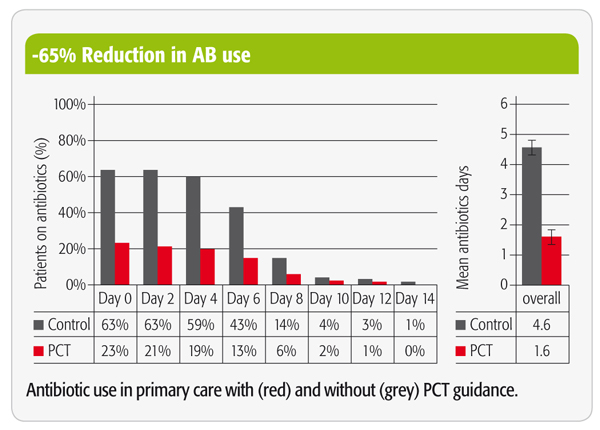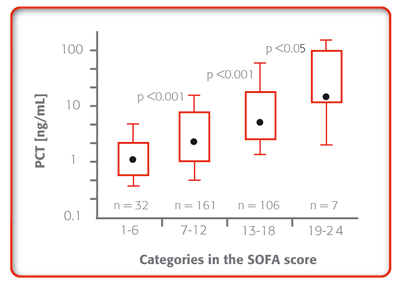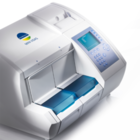VIDAS® B.R.A.H.M.S PCT™
A specific marker of severe bacterial infection and sepsis
Fully adapted for emergency conditions, VIDAS® B.R.A.H.M.S. PCT™ aids physicians in making rational clinical decisions and allows optimized patient management. Results are available in only 20 minutes.
Procalcitonin has been demonstrated to:
- Help assess the severity and prognosis of an infection
- Support early diagnosis of sepsis
Do you need more information
Procalcitonin (PCT) helps differentiate bacterial from viral infections, the early detection of an elevated PCT level in patients with suspected bacterial infections enabling earlier antibiotic treatment. PCT also supports informed decisions on when to continue or stop antibiotics, improving patient care and decreasing antibiotic misuse and resistance.
VIDAS® B.R.A.H.M.S PCT™ is an automated test for the determination of procalcitonin (PCT) in human serum or plasma.
Early Diagnosis and Monitoring
- Early and highly specific marker for severe bacterial infection
Procalcitonin (PCT) is detected in the blood stream within 3 to 6 hours after an infectious challenge. It is upregulated in response to bacterial but not viral infections. The marker’s level rises with increasing severity of infection, and returns to normal as the infection resolves.
- Useful tool to monitor treatment efficacy
PCT has a half-life of 24 hours. In adults, levels decrease daily by around 50% if the bacterial infection is controlled by the immune system supported by effective antibiotic therapy. Non-decreasing levels may point to treatment failure.

Kinetic profiles of different biomarkers of bacterial infection - Click to enlarge
(adapted from Meisner et al., 19991)
PCT impact on Antibiotic Therapy
Use of Procalcitonin in CRITICAL CARE: SEPSIS
In clinical studies including more than 1,000 ICU patients it has been demonstrated that the application of a decision algorithm based on the relative decrease of plasma PCT levels over time allows a significant reduction in the duration of antibiotic therapy and the length of ICU stay, without apparent harm to patients with severe sepsis and septic shock2,3.

Procalcitonin-based algorithm for the decision to continue or stop antibiotics for patients
with sepsis in intensive care units - Click to enlarge
(adapted from Bouadma et al., 20104 and Schuetz et al., 20115)
Use of Procalcitonin in PRIMARY CARE: LOWER RESPIRATORY TRACT INFECTIONS (LRTI)
Due to the high specificity of PCT for bacterial infection, PCT measurement at relatively low concentrations can identify patients with clinically relevant bacterial infection of the lower respiratory tract (LRTI) who require antibiotic therapy6,7.
Procalcitonin-based algorithm for the decision to start antibiotics for patients
with suspected low or moderate risk LRTI - Click to enlarge
(adapted from Schuetz et al., 20115)
Data from multicenter randomized controlled trials in more than 1,000 patients with LRTI could demonstrate that with this approach, antibiotic exposure could be reduced by 65% in a primary care setting6. Importantly, there was no impairment of the patient outcome compared to standard treatment6.
Click to enlarge
Assessment of Severity and Prognosis
It has been demonstrated that increased PCT values are the best indicator for the severity of infection and organ dysfunction8. As PCT levels correlate with severity of infection (as assessed by SOFA/Sequential Organ Failure Assessment score), an increase in PCT indicates progression of sepsis.
Assessment of severity of disease (increasing organ dysfunction) by PCT
(adapted from Meisner M.9)
Solution adapted to Emergency Settings
Choose VIDAS® B.R.A.H.M.S PCT™ to take advantage of key benefits:
- Rapid result: 20 minutes
- Ease-of-use:
- Fully automated test on bench top VIDAS® instrument
- Cost-effective solution:
- Single-dose format
- All reagents included in the kit
- Monthly calibration
- VIDAS® B.R.A.H.M.S PCT™ is part of a large VIDAS® Emergency Diagnostic solution, which also includes markers of cardiac necrosis, heart failure and thrombosis
References:
- Meisner M., J Lab Med 1999;23:263-72
- Kopterides P et al., Crit Care Med 2010; 38: 2229-41
- Schuetz P et al., Expert Rev Anti Infect Ther 2010, 8(5):575-587
- Bouadma et al., Lancet 2010;375: DOI:10.1016/S0140-6736(09)61879-1
- Schuetz P et al., Arch Intern Med 2011;171:1322-1331
- Schuetz P et al., Clin Infect Dis, 55: 651-662
- Christ-Crain M et al., Lancet 2004, 363: 600-607
- Harbarth S et al., Am J Respir Crit Care Med 2001,164 :396-402
- Meisner et al., Crit Care 1999, 3:45-50
Technical specifications for VIDAS® B.R.A.H.M.S. PCT™
| Reference | 30450 |
| Tests / kit | 60 |
| Sample type | Plasma (Lithium heparinate) or serum |
| Sample volume | 200 uL |
| Time to result | 20 minutes |
| Measuring Range | 0.05 - 200ng/mL |
| Calibration stability | 28 days |
Find more technical details on www.myvidas.com.
Consult your local bioMérieux representative for product availability in your country.
Related publications
- Schuetz P, Briel M, Christ-Crain M, et al. Procalcitonin to Guide Initiation and Duration of Antibiotic Treatment in Acute Respiratory Infections: An Individual Patient Data Meta-Analysis. Clin Infect Dis 2012;55(5):651-62.
- Schuetz P, Chiappa V, Briel M et al. Procalcitonin algorithms for antibiotic therapy decisions: a systematic review of randomized controlled trials and recommendations for clinical algorithms. Archives of Internal Medicine 2011, 171(15):1322-1331.
- Kopterides P, Siempos, II, Tsangaris I, Tsantes A and Armaganidis A. Procalcitonin-guided algorithms of antibiotic therapy in the intensive care unit:a systematic review and metaanalysis of randomized controlled trials. Crit Care Med 2010;38 (11): 2229-41
- Schuetz P et al. Procalcitonin for guidance of antibiotic therapy. Expert Rev Anti Infect Ther. 2010 May;8(5):575-87. doi: 10.1586/eri.10.25
- Christ-Crain M, Jaccard-Stolz D, Bingisser R et al. Effect of procalcitonin-guided treatment on antibiotic use and outcome in lower respiratory tract infections: cluster-randomised,single-blinded intervention trial. THE LANCET- Lancet 2004, 363(9409) : 600-607,20
- Harbarth S et al. Diagnostic value of procalcitonin, interleukin-6, and interleukin-8 in critically ill patients admitted with suspected sepsis. Am J Respir Crit Care Med 2001 Aug 1;164(3):396-402.
Guidelines
Tools
PCT Decisional Algorithm slide ruler
Can be downloaded from www.myvidas.com. Register now!
Useful links
Find more scientific and educational resources on www.myvidas.com.









